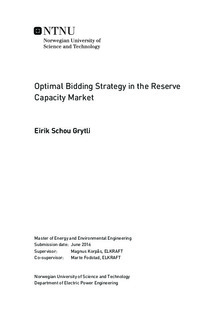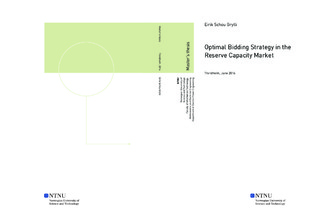| dc.description.abstract | Good balancing services is a prerequisite for a well-functioning power market. Additionally
to the day-Ahead market (DA) for electricity, there is a balancing market (BM)
which provides the necessary buffers to handle short visibilities and uncertainties,such
as frequency deviations, in the grid. To ensure that enough balancing reserves are available,
a reserve capacity market(RKOM) has been created as an incentive for participants
in the power market to reserve capacity exclusively for the BM. As part of the project
"Integrating Balancing Markets in Hydro Power Scheduling Methods" was a short term
hydro power scheduling model implemented,by SINTEF Energy, in the mathematical
programming tool AMPL. It is a multi stage, multi scenario stochastic optimization
problem.
The main purpose of this thesis has been to evaluate how participating in RKOM affects
the decision making of a hydro power producer compare to only participating in the
DA and BM. The weekly time resolution of the reserve capacity market makes it diffi-
cult to analyze in already excising hydro power scheduling models. Consequently, the
model implemented in AMPL by SINTEF Energy has in this thesis been expanded and
altered to incorporate the reserve capacity market. The main changes, in the model,
were done considering the model s time horizon, and the scenario tree input used in
the model.Stage wise scenario reduction was used to handled some of the challenges
considering the model expansion. The model expansion was called AMPLWeek and
is meant as decision-support for a hydro power producer considering bids in RKOM.
Additionally, a simulation method, that includes AMPLWeek, was created to observe
how simulation over multiple weeks, and seasons, affects short term scheduling. This
was done by incorporating the changes in the reservoir level and water values, created
by ProdRisk, over several weeks of operation. The study sought to answer how
decision-making changes by participating in RKOM. A case study was done considering
Statkraft s Tokke-Vinje hydro power plant in the NO2-area of Norway. To evaluate
the efficiency of RKOM, and to see if there are any gains for a hydro power scheduling
to participate in this market, the model was evaluated for different RKOM prices and
different seasonal simulations. This thesis also intents to evaluate the benefits of using
a weekly scheduling plan compared to a daily time horizon, and how doing seasonal
simulations affects the decision making for the hydro power producer. It is also considered
to which extent scenario reduction affects the approximation done considering
DA and BM prices in this thesis.
The work presented in this thesis demonstrates that a hydro power producer s willingness
to reserve capacity in RKOM increases with an increased RKOM price. The average
power dispatch in the DA and the down regulation dispatch in BM decreases with
a higher RKOM price. Smaller changes could be observed in the average up regulation
dispatch, in form of a bell shaped curve, with increasing RKOM price. The up regulation
dispatch is higher for a low RKOM price than for a high RKOM price. Results from seasonal
simulations indicates that participating in RKOM is most profitable during spring
and summer, when day-ahead prices and reservoir levels are low. Comparative analysis
of a weekly and daily time horizon demonstrates that the optimal reserved capacity in
ii
RKOM changes based on the time horizon. A lower objective value is obtained with a
weekly time horizon.
The main finding of this thesis is that RKOM is a profitable market for a hydro power
producer. Further, the bell-shaped curve of average up regulation dispatch with respect
to RKOM price might indicate that incentive created by RKOM not necessarily
increase the participant s dispatch in BM. Whether this is due to model simplifications
or also can be observed in the real market is unknown, and recommended as
further work. It was also concluded that seasonal simulations provides useful information
about changes in hydro system parameters, like reservoir levels, not observed
by a weekly optimization. It also follows from the results of this thesis, that scheduling
model with a weekly time horizon provides better decision support than a model with
a daily time horizon. | |

